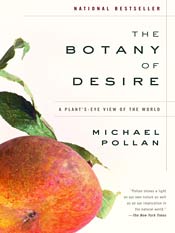
Saturday, May 02, 2009
 Sticky Fingers Scone Mixes..
Sticky Fingers Scone Mixes..I just wanted to remind all of you that these are the most amazing scone mixes I have EVER tried. They are all natural and delicious. No fuss baking. All you do is add water and bake. These are great to include in your Mother's Day gift baskets. Stop by Botany's Desire and pick some up.
Friday, May 01, 2009

Transplanted to a bare Wheeler stage, Botany of Desire blooms as a musical
By Barry Bergman, Public Affairs | 01 May 2009
BERKELEY — The book that made Michael Pollan famous, The Botany of Desire, has been called many things: graceful, erudite, witty, insightful, provocative, paradigm-altering, even delicious.
 Michael Pollan's 2001 book explored the coevolutionary dance between people and plants — but the music, until now, was all in the prose.
Michael Pollan's 2001 book explored the coevolutionary dance between people and plants — but the music, until now, was all in the prose.But it took Alex Harvey and John Gromada, currently artists-in-residence at the campus's Arts Research Center, to see the 2001 bestseller as fodder for a musical. Fittingly, given Botany's scholarly interest in plant-based intoxication, their unlikely adaptation took root during an alcohol-fueled conversation in a Houston bar. Not only did Harvey, a director, and Gromada, a composer and sound designer, discover their shared admiration for Pollan's elegant prose. Each, it turned out, dreamed of cultivating the book — whose subtitle, A Plant's-Eye View of the World, hardly evokes the smell of greasepaint — into theater.
On Friday evening, hundreds of Pollan's legions of fans — readers of his five books and frequent New York Times Magazine articles, students at the Graduate School of Journalism, friends, colleagues, and the just-plain curious — nearly filled 760-seat Wheeler Auditorium for a taste of the odd hybrid Pollan himself had sampled, in draft form, only days before. The stripped-down reading, featuring a cast that mixed professional and community actors and musicians with Berkeley students, was billed as a work-in-progress. Its director advised the audience to "think of this as an on-stage radio rehearsal."
Harvey, whose directing credits include theater productions in New York, Chicago, Santa Cruz, and Edinburgh, also had a pre-show message for Pollan, Berkeley's Knight Professor of Science and Environmental Journalism.
"Michael, I still can't believe that you're letting me do this," he told the author, who was seated front-row center. "You're absolutely out of your mind."
Few, however, seemed to agree with that assessment. Over the next 75 minutes, a cast of some two dozen uncostumed performers — alternately standing or seated in folding chairs on the bare Wheeler stage, reading from scripts and scores on music stands and singing to (mostly) prerecorded accompaniment — gave voice to a parade of figures familiar to readers of Pollan's book, from Johnny Appleseed to the author's then-toddler son, whose first experience of chocolate (on his first birthday) comes as one of Botany's epiphanies.
Also prominent is "Bob Smith," recognizable as Pollan's misguided guide to the mystery of John Chapman, who scattered his wild apple seeds throughout the Northwest Territory during the first half of the 19th century. Thanks to the likes of Carrie Nation and Walt Disney, Botany asserts, the legend of the sexually ambiguous, cider-mongering "American Dionysus" known as Johnny Appleseed was domesticated until — like the bland, made-over Red Delicious — it lost all taste and texture.
Besides Chapman, who is mainly an unseen presence, the play's dramatis personae include Henry Thoreau, Jonathan Swift, Matthew Arnold, and The Gardener's wife, portrayed by Lura Dolas, a teacher in the Department of Theater, Dance, and Performance Studies.
The book is divided into four long chapters, each of which explores a different plant — the apple, the tulip, marijuana, and the potato — and the associated human desires that have helped them to flourish over the centuries. The stage version, thus far, covers only the first section, placing most of Pollan's insights into the mouth of The Gardener, played by veteran Bay Area actor Dan Hiatt, and another character depicted by graduating geography student Daniel Desmarais. (Will Austin, a senior in political science, voiced the role of Bob Smith.) Add in musical numbers, enactments of apple fairs and drunken brawls, out-loud readings of stage directions, and dramatizations of what, in the book, may take only a single paragraph — that first-birthday celebration, for instance — and you've got a recipe for a very long night at the theater, as Gromada noted once the figurative curtain came down. The apple section will be pruned, he promised, and the completed work will ultimately run about 2 ½ hours.
Pollan, who took to the stage post-performance, pronounced the evening "kind of thrilling."
"I've just had an out-of-body experience," he declared, munching on an apple. To Harvey and Gromada, eating apples beside him, he said: "To dramatize interpretation is not easy, but you did it."
Those who stayed for the question-and-answer session — perhaps half the original audience — learned that the pair's current plan for the marijuana section is to present it on 3-D animated screens.
During the performance itself, meanwhile, virtually no one left the auditorium, seemingly seduced by the combination of words, music, and observations on the evolutionary dance between people and plants. Just as the flower "manipulates" the bee into spreading its seeds, Pollan wrote in The Botany of Desire, the apple "manipulated" man into helping it prosper. Ditto for flowers, weed, and tubers.
And for several hundred fans of the book — some of whom, perhaps, feared that dramatizing its prose might amount to gilding the lily — Botany, the musical, proved a surprisingly fruitful form of creative evolution.














